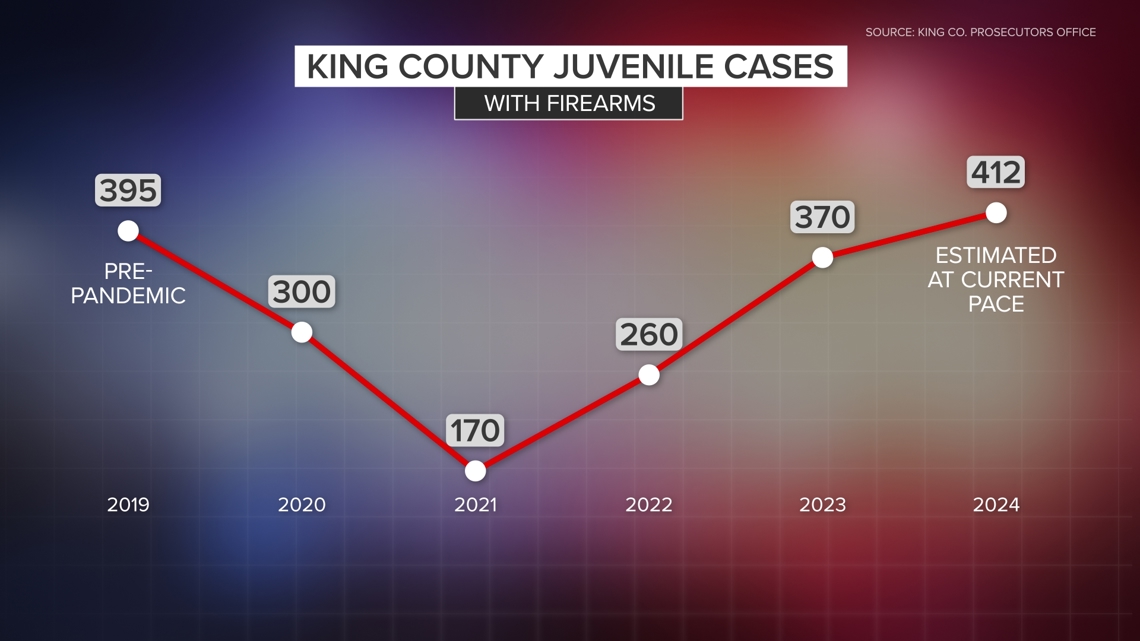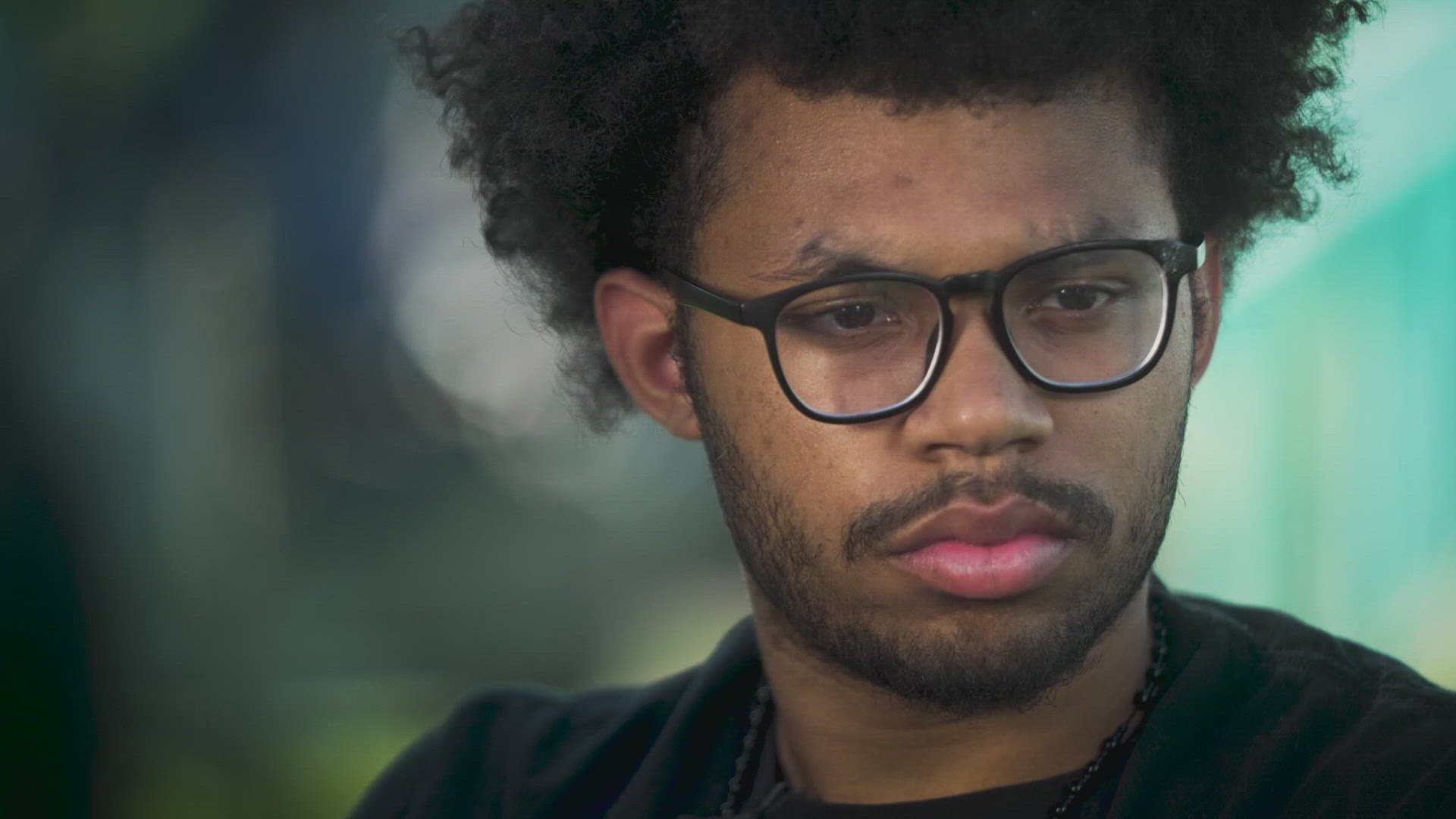SEATTLE — On a Wednesday afternoon in September, a judge in King County Juvenile Court said he was "shocked" by the circumstances of a case, admitting such feelings have become a rarity. It was one of the approximately 30 cases cycling through the court that particular day.
It was an assault case in which the victim was badly beaten and disfigured.
As part of a special series, Underage and Under Arrest, KING 5 analyzed data from King, Snohomish and Pierce counties, revealing juvenile crime is trending up, especially when it comes to serious crimes. Cases involving kids with guns is on pace to surpass pre-pandemic numbers.
Last year, there were 723 juvenile cases filed in King County.
"We're seeing a significant rise in juvenile crime rates where we're talking about more serious crimes," said King County chief juvenile prosecutor Jimmy Hung. "What is really concerning is ... the cases are more serious. We can really directly relate that to children having more access to guns."


According to data provided by the King County Prosecuting Attorney's Office, 2024 is on pace to match the number of juvenile felony cases filed in 2019, at a total of 232. That would also mark a 314% increase in similar crimes from 2021.
"There are incredibly dedicated, hardworking, brilliant people working in the system," Hung told KING 5. "We're like the ER, people come to us in crisis and we may not be able to save everyone and fix everybody. That doesn't mean the ER is failing, or not doing its job. It might mean the people that are showing up are too damaged or the issues are too serious for us to fix, so it might be on us as community to figure out: why are so many coming to the ER in the first place?"
Hung estimates roughly 10% of the county's youth are committing 90% of the crimes that are prosecuted; in other words, a relatively small group of teens are committing the majority of the crimes his office prosecutes.
Additionally, Hung estimates more than half of the kids who spend time locked up in detention then go on to commit new crimes.
"These would be the most serious crimes that we're talking about," he said. "The numbers aren't great. Somewhere around 51 percent."
By comparison, he said the recidivism rate is only about 10% when it comes low-level and first-time offenders who are not placed in juvenile detention.
'Some people in there treat you like you're nothing'
For 16-year-old TyShawn Pinckney of Kent, the trouble began during the pandemic.
"I was always getting bored at home, I just wanted to go out. I had this one friend, he was just bad. I started hanging out with him more. He encouraged me to sneak out, not go home and run away. I liked that," Pinckney said. "So I started doing that more. ... Then I did some really dumb stuff and got caught up. I went to juvy for the first time."
He's not sure if he was 12 or 13 when he had his first run in with police, or even how many times he's been arrested. His dad guesses it's been at least 10 times.
"The first charge was a misdemeanor, it was like a traffic violation or something. Then, a couple other ones were theft of motor vehicle, robbery and honestly, I don't even remember," Pinckney told KING 5.
His arrests have led to stints in the youth detention center.
"Some people in there treat you like you're nothing, like an animal. When you're in there, it's kind of depressing. You just look at walls all day, the same faces all day," Pinckney said.
A spokesperson for the county's Department of Adult and Juvenile Detention said there are nearly 40 programs for offenders, in addition to education, recreation and spiritual services. In all, the county will spend about $800,000 on programs behind bars this year.
"I think the process can be handled way differently," said TyShawn's father, Jerry. "A lot of these kids, it's a mental thing. Mentally, they've been abused and they have issues and there's no one there. It's the same thing over and over. It's like putting a Band-Aid over a bullet wound. There needs to be a place where they can be mentally fed."
In King County, youth offenders are given a choice to opt in or out of non-school programs and roughly 70% of youth in custody participate in voluntary programming, a spokesperson said.
Despite that, the recidivism rate isn't budging.
"Some of the people I know are devils; they have them devilish mindsets. They actually enjoy seeing people get hurt, they really enjoy it," Pinckney said. "That's on them, I can't change that, but I stopped surrounding myself around those kinds of people."
The very idea of locking teens up has become a controversial topic in King County. Despite passionate pleas from community members to close the youth detention down, King County councilmembers voted unanimously to keep it open.
"Young people need to be held accountable, kept within boundaries. If they're doing great, give them a lot of rope to do things, but if they're messing up, you gotta tighten the reins," said vice chair Reagan Dunn. "Closing the jail would've been catastrophic for recidivism in our community. It would have been flat out dangerous and irresponsible to close it and send those kids back out on the street."
After four years in and out of the system, Pinckney said he's finally focused on staying out of trouble.
"I have a little brother and he looks up to me, and he's kind of like me so I was like, 'Dang, I gotta be there for lil' bro,'" he said.

